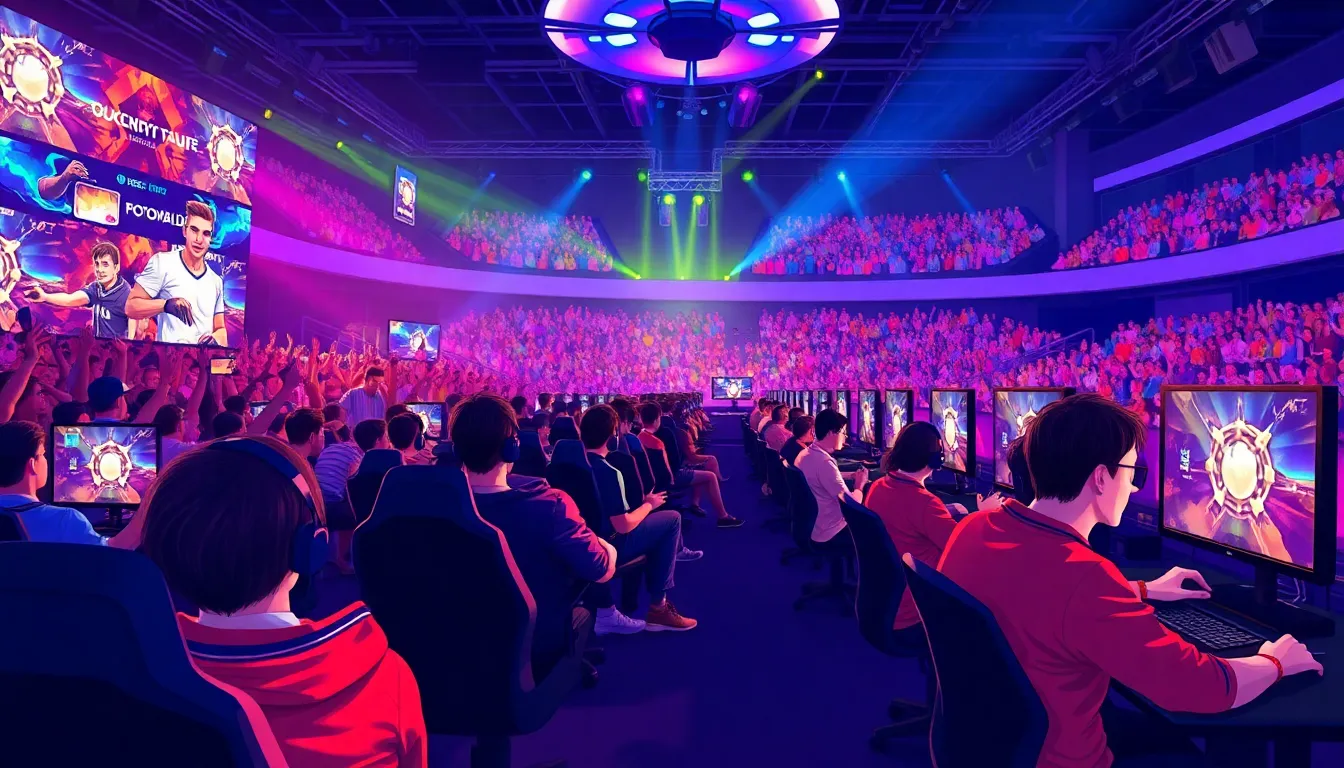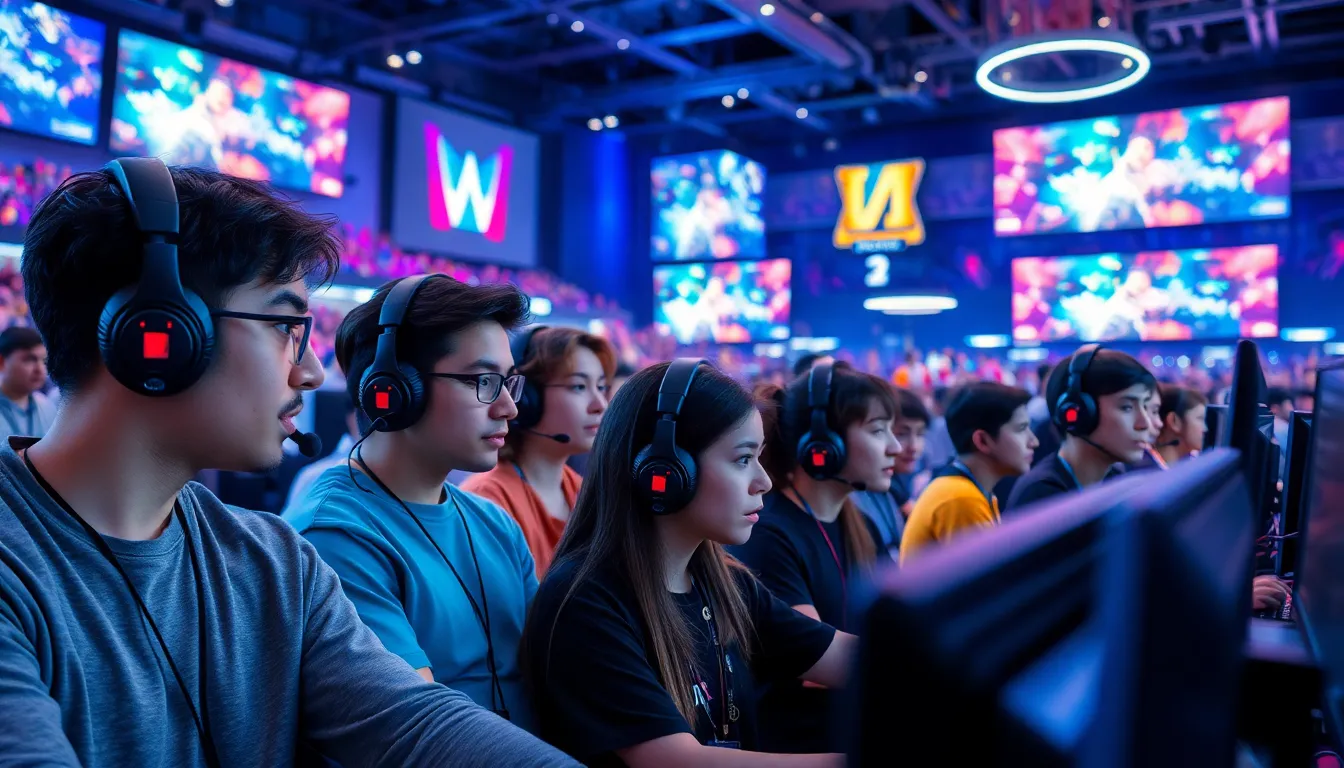In a world where the couch is king and snacks reign supreme, video game tournaments have become the ultimate battlegrounds for digital warriors. Picture this: players from all walks of life, armed with controllers and an unyielding desire to conquer, gather to showcase their skills and claim glory. It’s not just a game; it’s a spectacle that transforms ordinary folks into legends, one pixel at a time.
Table of Contents
ToggleOverview of Video Game Tournaments
Video game tournaments showcase the competitive spirit inherent in gaming culture. They feature a wide range of genres, including first-person shooters, real-time strategy games, and multiplayer online battle arenas. Players from various regions unite to compete for prizes, recognition, and the thrill of victory.
Participants often include both amateur and professional gamers. Professionals frequently attend tournaments to gain exposure and advance their careers. Many tournaments draw large audiences both online and in-person, with streaming platforms broadcast events to global viewers.
Structures for tournaments vary greatly. Single-elimination formats allow quick progression, while double-elimination formats offer players a second chance after a loss. Some tournaments operate under round-robin systems, ensuring every participant competes against multiple opponents.
Prizes also vary, with many tournaments offering cash rewards, sponsorships, and exclusive merchandise. Prize pools can reach impressive amounts, with some events boasting millions in total rewards. Noteworthy tournaments include The International for Dota 2, League of Legends World Championship, and EVO for fighting games.
Sponsorships play a crucial role in the success and growth of tournaments. Major brands seek visibility and marketing opportunities by associating with popular gaming events. Partnerships with gaming organizations further enhance the spectator experience through innovative technology and immersive setups.
In terms of accessibility, local tournaments facilitate entry for casual players. These smaller events serve as entry points into the competitive scene, allowing newcomers to develop skills and connect with others in the community. Online tournaments have also flourished, making participation easier for individuals unable to attend live events.
The evolution of video game tournaments reflects the industry’s growth and the increasing significance of competitive gaming in popular culture. As gaming continues to expand, tournament structures and participant experiences will likely adapt to meet changing demands.
Types of Video Game Tournaments

Video game tournaments take two primary forms: online and offline. Each format provides unique experiences for participants and audiences alike.
Online Tournaments
Online tournaments allow players to compete from anywhere in the world. Competitors join via streaming platforms, with many gamers participating through gaming consoles or PCs. Scheduling flexibility makes online tournaments appealing, accommodating various time zones. Platforms like Battlefy and ESL host numerous events, creating access for casual gamers and professionals. Participants can earn recognition and prizes ranging from cash rewards to sponsored merchandise. Spectators also benefit from engaging live streams that showcase high-level gameplay and commentary.
Offline Tournaments
Offline tournaments gather gamers in physical locations, often leading to a charged atmosphere. These events frequently feature large arenas like convention centers where fans can cheer for their favorite players. Well-known tournaments, such as the EVO Championship Series, highlight the competitive gaming scene with live audience engagement. Players participate in person, adding to the excitement and intensity of matches. Offline tournaments typically offer significant prizes, boosting competition levels. Networking opportunities also arise, allowing players to connect with sponsors, teams, and other gamers in their community.
Popular Video Game Tournaments
Video game tournaments attract massive audiences and draw in top-tier competitors. They often showcase the best in gaming talent through various renowned leagues.
Major League Gaming (MLG)
Major League Gaming stands out as one of the oldest and most respected esports organizations. Founded in 2002, MLG focuses primarily on competitive gaming, hosting tournaments in popular titles like Call of Duty and StarCraft II. It pioneered live streaming of tournaments, enhancing visibility for players and games. MLG tournaments typically feature substantial cash prizes, drawing top talent from around the globe. Many enthusiasts engage with the league through its comprehensive coverage and community events. They further enrich the gaming landscape by attracting sponsors and partnerships, ensuring continued growth and innovation.
Electronic Sports League (ESL)
Electronic Sports League is a leading organization in the esports industry. Established in 2000, ESL has built a reputation for hosting major tournaments across numerous game titles, such as Counter-Strike, Dota 2, and Rainbow Six Siege. Its commitment to competitive integrity ensures fair play and professionalism in all events. ESL organizes both online and offline tournaments, catering to players at various skill levels. Significant competitions, like ESL One, draw enormous crowds and feature lucrative prize pools. Community involvement and outreach initiatives also bolster player participation and growth. Engagement with fans and players alike remains a priority for ESL, solidifying its status as a key player in competitive gaming.
Benefits of Participating in Video Game Tournaments
Participating in video game tournaments offers numerous advantages that extend beyond mere competition. Players enhance their skills while enjoying a vibrant community atmosphere.
Skill Development
Players experience significant improvement in their gaming skills when participating in tournaments. Competitive pressure encourages them to refine strategies and optimize gameplay. Practice against varied opponents accelerates learning and adaptability. They face diverse playstyles, pushing them to think critically and execute precise maneuvers. Exposure to high-stakes environments builds confidence, making players more adept in future matches. Many participants also gain insights into team dynamics and communication while implementing strategic teamwork. Skill growth seen in tournament settings often translates to other competitive scenarios, supporting players’ overall gaming journey.
Community Engagement
Engagement in video game tournaments fosters a sense of belonging among players. Networking opportunities abound, as participants connect with like-minded individuals who share a passion for gaming. Friendships often develop within the competitive scene, leading to lasting relationships beyond the events. Local tournaments create a supportive environment that nurtures aspiring gamers while encouraging collaboration and mentorship. They also bring diverse groups together, promoting inclusivity and cultural exchange. These interactions contribute to a robust gaming community, enhancing the overall tournament experience. Social media channels and streaming platforms amplify community engagement, connecting players and fans worldwide.
Challenges Faced in Video Game Tournaments
Video game tournaments present unique challenges for participants and organizers alike. These hurdles can impact the overall experience for everyone involved.
Technical Issues
Participants often encounter technical issues during tournaments. Connectivity problems, including lag and disconnections, disrupt gameplay and can affect outcomes. Hardware failures like controller malfunctions or system crashes present additional obstacles, causing frustration among competitors. Tournament organizers face challenges in ensuring stable internet connections and reliable equipment. Players frequently rely on the integrity of the platform used for online competitions, as platform downtimes can hinder access. Therefore, advanced planning and testing become essential to mitigate these technical difficulties and provide a seamless experience.
Competitive Stress
Competitive stress remains a significant challenge in video game tournaments. Intense pressure to perform can affect a player’s focus and decision-making abilities. Players often feel the weight of expectations from fans, sponsors, and teammates, leading to anxiety. Maintaining composure under scrutiny is vital, as mistakes can have immediate consequences. The high stakes associated with tournament-level play further amplify this stress, often resulting in performance fluctuations. Developing coping strategies and mental resilience becomes crucial for competitors to navigate these emotional challenges and achieve their best performance.
Future of Video Game Tournaments
Growing technology will shape the future landscape of video game tournaments. Enhanced virtual reality and augmented reality experiences are expected to offer unprecedented immersion for participants and audiences. Tournament organizers will leverage artificial intelligence to create tailored experiences, optimizing matchmaking and scheduling processes.
Increased investment from brands will support larger prize pools and better venues. Sponsorship deals often promise enhanced marketing strategies that benefit both the games and the brands involved. With more viewers tuning in, streaming platforms will experience growth, and product placements during events will become more strategic.
Youth engagement in gaming will bolster tournament participation. As more young players enter competitive scenes, diversity in skill levels will increase, fostering varied tournament formats. Community-driven events are likely to thrive, encouraging local gamers to compete and build connections in their areas.
Online tournaments will continue to dominate as global participation expands. Flexibility in scheduling will help accommodate different time zones, allowing for broader competition. Offline events might evolve by integrating hybrid formats that combine the electrifying atmosphere of live audiences with online participation.
Collaboration among game developers, tournament organizers, and players will play a crucial role. This partnership may yield innovations that enhance player experiences and improve the overall competitive landscape. As the community forges ahead, ethical considerations and fair play standards will remain paramount in shaping tournament regulations.
As video gaming evolves into a prominent cultural phenomenon, tournaments will increasingly capture public interest. Future events might not only focus on competition but also celebrate the culture surrounding gaming, integrating performances and fan interactions. Enthusiasts will witness thrilling developments that redefine what it means to engage in and enjoy video game tournaments.
Video game tournaments represent a vibrant intersection of competition and community. They elevate players while fostering connections among enthusiasts worldwide. As technology advances and engagement grows, the landscape of these tournaments will continue to evolve.
The future promises even more immersive experiences and broader participation. With brands investing in the esports scene, the potential for larger prizes and innovative formats is on the horizon. Ultimately, video game tournaments will not only showcase skill but also celebrate the culture that unites gamers across the globe.




